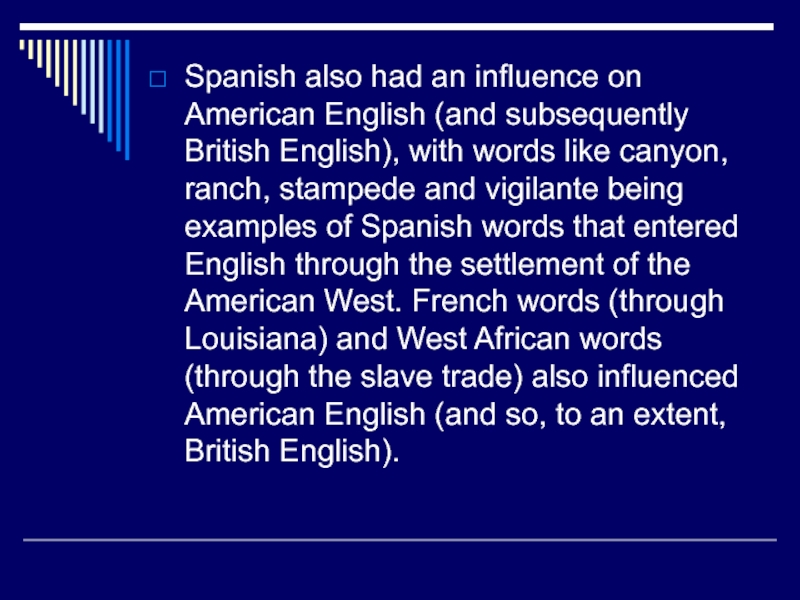Скачать материал

Скачать материал




- Сейчас обучается 268 человек из 64 регионов




Описание презентации по отдельным слайдам:
-
1 слайд
The Development of English Word-Stock in the XII-XVII cen.
Middle English lexicon:
a) Scandinavian borrowings
b) French words
c) Latin borrowings
d) Words from Low countries
2. Early Modern English lexicon -
2 слайд
Scandinavian Influence
Sk: sky, skin, skill, skirt, (OE scyrte – shirt);
Retention of the hard pronunciation of k and g: kid, dike (gitch), get, give
Place names: (600 place): Derby, Rugby (districts occupied by Danes)
Nouns: root, trust, want, window
Verbs: get, give, die, crawl, raise -
-
4 слайд
French borrowings (2 stages)
1066 – 1250 (900 in number)
1250 – 1500 -
5 слайд
1066-1250
a) French speaking nobility: noble, dame, servant
b) Literary channels (Charlemagne’s romances): story, rime, lay
c) Church terms -
6 слайд
1250-1500
Government and Administrative terms:
government, administer,
a) Fundamental terms:
crown, state, empire, realm, reign, royal, tax, parliament, subsidy.
b) Titles of offices:
office, treasurer
c) Economic organization of the society:
peasant, slave, servant -
-
-
-
-
-
12 слайд
Ecclesiastical Words:
religion, theology, baptism, confession, prayer, lesson, passion.
Indications of rank or class: clergy, clerk, dean, abbess
The names of objects associated with religion: crucifix, image
Fundamental religious or theological concepts: salvation, virgin -
13 слайд
Law
Names of crimes and misdemeanors: felony, arson, larceny, fraud
Suits, involving property: estate, bounds, property
Adjectives: just, innocent. -
14 слайд
Army and Navy:
Navy, arms, battle, defense, soldier, spy, guard
Weapon: dart, lance
Verbs: to arm, to array, to defend -
15 слайд
Fashion, Meals and Social Life
Gown, robe, frock, collar, embroidery
Verbs: adorn,
Collors: blue, brown, scarlet;
Dinner, supper, feast. -
16 слайд
Art, learning, medicine
Art: art, painting, music, image, beauty
Literature: poet, romance, chapter
Medicine: physician, surgeon, malady -
-
-
-
-
-
-
-
-
25 слайд
Latin Borrowings (third period):
Intellect, legal, limbo, zenith
Terms relating to law, medicine, theology, science, literature: -able, -ible, -ent, -al, -ous, -ive.
Aureate terms: unusual words: equipolent -
-
-
-
29 слайд
Synonyms of three levels:
Deed – exploit
Take – apprehend -
30 слайд
Towards the end of Middle English, a sudden and distinct change in pronunciation (the Great Vowel Shift) started, with vowels being pronounced shorter and shorter. From the 16th century the British had contact with many peoples from around the world.
-
31 слайд
Words from Low Countries: Flemish, Dutch, Low German
trade: (Flemish)
navigation (Dutch and Low German)
deck, freight, dollar -
32 слайд
French:
Classical languages: free borrowing and reconstitution of roots and affixes often in combination with native words and other loans; many Latin borrowings were doublets of words previously borrowed from French or Latin (invidious/envious, camera/chamber, paralysis/palsy, fragile/frail); Greek loans were highly specialized, scholarly words (anarchy, aorist, aphrodisiac) -
33 слайд
Lat: factum, French: fait, English: feat
Verbs (Lat. or French?) explore, destroy. -
34 слайд
French, many borrowings in specialized words (hospitable, gratitude, sociable); Italian, terms in trade, architecture, the arts (tariff, sonata, oratorio, balcony, ghetto); Spanish and Portuguese, terms related to exploration, colonization, exotic products (Spanish: cigar, potato, tomato, hammock, breeze, cockroach; Portuguese: mango, tank, yam, molasses); Dutch, terms in trade, seafaring, painting (cruise, yacht, landscape, sketch, brandy, uproar); German, terms in geology, mining, etc. (quartz, zinc, noodle, plunder, waltz); Celtic (leprechaun, plaid, shamrock, trousers, whiskey).
-
35 слайд
Romance Languages
French (books): chocolate, detail, progress
Italian: balcony, algebra, design, violin, volcano
Spanish and Portuguese: anchovy, armada, apricot, tobacco -
36 слайд
Non-Indo-European Languages
English settlements in North America, borrowings mostly from from Algonquian languages, cultural terms, names of plants, animals, objects (moose, raccoon, skunk, hominy, pecan, squash); Asian languages, Chinese (ketchup, tea, ginseng), Japanese (soy, sake), Hindi (jungle, shampoo, bandanna) -
37 слайд
Word Formation
affixing was the largest source of new words in English; new derivational affixes from Latin and Greek;
compounding (buttercup, jellyfish, nutcracker, pickpocket, good-looking, old-fashioned);
functional shift or zero derivation (noun to verb: badger, capture, pioneer); -
38 слайд
clipping (arrear > rear);
back-formation (greedy > greed, difficulty > difficult, unity > unit);
blending (dumb + confound > dumfound);
proper names>common nouns (Fauna > fauna); -
39 слайд
echoic words (boohoo, boom, bump, bah, blurt);
folk etymology (Dutch oproer [up + motion] > uproar); verb + adverb (take-out pick up);
reduplication (so-so, mama, papa);
words of unknown origin (baffle, chubby, lazy, pet, sleazy) -
40 слайд
Varieties of English
From around 1600, the English colonization of North America resulted in the creation of a distinct American variety of English. -
41 слайд
In some ways, American English is more like the English of Shakespeare than modern British English is. Some expressions that the British call «Americanisms» are in fact original British expressions that were preserved in the colonies while lost for a time in Britain (for example trash for rubbish, loan as a verb instead of lend, and fall for autumn; another example, frame-up, was re-imported into Britain through Hollywood gangster movies).
-
42 слайд
Spanish also had an influence on American English (and subsequently British English), with words like canyon, ranch, stampede and vigilante being examples of Spanish words that entered English through the settlement of the American West. French words (through Louisiana) and West African words (through the slave trade) also influenced American English (and so, to an extent, British English).
-
Найдите материал к любому уроку, указав свой предмет (категорию), класс, учебник и тему:
6 210 158 материалов в базе
- Выберите категорию:
- Выберите учебник и тему
- Выберите класс:
-
Тип материала:
-
Все материалы
-
Статьи
-
Научные работы
-
Видеоуроки
-
Презентации
-
Конспекты
-
Тесты
-
Рабочие программы
-
Другие методич. материалы
-
Найти материалы
Другие материалы
- 27.12.2020
- 4749
- 2
- 27.12.2020
- 4947
- 11
- 27.12.2020
- 5785
- 13
- 27.12.2020
- 5022
- 9
- 27.12.2020
- 4057
- 1
- 27.12.2020
- 3882
- 0
- 27.12.2020
- 3905
- 1
- 27.12.2020
- 3300
- 4
Вам будут интересны эти курсы:
-
Курс профессиональной переподготовки «Клиническая психология: организация реабилитационной работы в социальной сфере»
-
Курс повышения квалификации «Организация практики студентов в соответствии с требованиями ФГОС педагогических направлений подготовки»
-
Курс повышения квалификации «Организация практики студентов в соответствии с требованиями ФГОС юридических направлений подготовки»
-
Курс профессиональной переподготовки «Логистика: теория и методика преподавания в образовательной организации»
-
Курс профессиональной переподготовки «Организация менеджмента в туризме»
-
Курс повышения квалификации «Финансы предприятия: актуальные аспекты в оценке стоимости бизнеса»
-
Курс профессиональной переподготовки «Управление ресурсами информационных технологий»
-
Курс профессиональной переподготовки «Организация деятельности по водоотведению и очистке сточных вод»
-
Курс профессиональной переподготовки «Эксплуатация и обслуживание общего имущества многоквартирного дома»
-
Курс профессиональной переподготовки «Техническая диагностика и контроль технического состояния автотранспортных средств»
-
Курс профессиональной переподготовки «Организация и управление процессом по предоставлению услуг по кредитному брокериджу»
-
Курс профессиональной переподготовки «Информационная поддержка бизнес-процессов в организации»
-
Курс профессиональной переподготовки «Стратегическое управление деятельностью по дистанционному информационно-справочному обслуживанию»
2.1.
General characteristics
An
analysis of the vocabulary in the Middle English period shows great
instability and constant and rapid change. Many words became
obsolete, and if preserved, then only in some dialects: many more
appeared in the rapidly developing language to reflect the
ever-changing life of the speakers and under the influence of
contacts with other nations.
2.2.
Means of enriching vocabulary in Middle English
2.2.1.
Internal means of enriching vocabulary
Though
the majority of Old English suffixes are still preserved in Middle
English, they becoming less productive, and words formed by means of
word-derivation in Old English can be treated as such only
etymologically.
Words
by means of word-composition in Old English, in Middle English are
often understood as derived words.
2.2.2.
External means of enriching vocabulary
The
principal means of enriching vocabulary in Middle English are not
internal, but external borrowings. Two languages in succession
enriched the vocabulary English of that period – the Scandinavian
language and the French language, the nature of the borrowings and
their amount reflecting the conditions of the contacts between the
English and these languages.
-
Scandinavian
borrowings
The
Scandinavian invasion and the subsequent settlement of the
Scandinavians on the territory of England, the constant contacts and
intermixture of the English and Scandinavians brought about many
changes in different spheres of the English language: word-stock,
grammar and phonetics. The relative ease of the mutual penetration of
the languages was conditioned by the circumstances of the
Anglo-Scandinavians contacts.
Due
to contacts between the Scandinavians and the English people many
words were borrowed from the Scandinavian language, for example:
Nouns:
law, fellow, sky, skirt, skill, egg, anger, awe, bloom, knife, root,
bull, cake, husband, leg, wing, guest, loan, race
Adjectives:
big,
weak, wrong, ugly, twin
Verbs:
call,
cast, take, happen, scare, hail, want, bask, gape, kindle
Pronouns:
they, them, their
The
conditions and the consequences of various borrowings were different.
-
Sometimes
the English language borrowed a word which it had no synonym. These
words were simply added top the vocabulary. Examples: law, fellow -
The
English synonym was ousted by the borrowing. Scandinavian Taken
(to
take)
and callen
(to
call)
ousted the English synonyms niman
and
clypian,
respectively. -
Both
the words, the English and the corresponding Scandinavian, are
preserved, but they became different in meaning. Compare Modern
English native words and Scandinavian borrowings:
Native
Scandinavian borrowing
Heaven
sky
Starve
die
-
Sometimes
a borrowed word and an English word are etymologically doublets, as
words originating from the same source in Common Germanic.
Native
Scandinavian borrowing
shirt
skirt
shatter
scatter
raise
rear
-
Sometimes
an English word and its Scandinavian doublet were the same in
meaning but slightly different phonetically, and the phonetic form
of the Scandinavian borrowing is preserved in English, having ousted
the English counterpart. For example, modern English to
give,
to
get
come from the Scandinavian gefa,
geta,
this ousted the English giefan
and gietan,
respectively. Similar English words: gift, forget, guild, gate,
again. -
There
may be a shift of meaning. Thus, the word dream
originally
meant “joy, pleasure”; under the influence of the related
Scandinavian word it developed its modern meaning.
-
French
borrowings
It
stands to reason that the Norman Conquest and the subsequent history
left deep traces in the English language, mainly in the form of
borrowings in words connected with such spheres of social and
political activity where French-speaking Normans had occupied for a
long time all places of importance. For example:
-
Government
and legislature:
government,
noble, baron, prince, duke, court, justice, judge, crime, prison,
condemn, sentence, parliament, etc.
-
military
life:
army,
battle, peace, banner, victory, general, colonel, lieutenant, major,
etc.
-
religion:
religion,
sermon, prey, saint, charity, etc.
-
city
crafts:
painter,
tailor, carpenter, etc. (but
country occupations remained English: shepherd, smith, etc.)
-
pleasure
and entertainment:
music,
art, feast, pleasure, leisure, supper, dinner, pork, beef, mutton,
etc. (but
the corresponding names of domestic animals remained English: pig,
cow, sheep)
-
words
of everyday life:
air,
place, river, large, age, boil, branch, brush, catch, change, chain,
chair, table, choice, cry, cost, etc.
-
relationship:
aunt,
uncle, nephew, cousin.
The
place of the French borrowings within the English language was
different:
-
A
word may be borrowed from the French language to denote notions
unknown to the English up to the time:
Government,
parliament, general, colonel, etc.
-
The
English synonym is ousted by the French borrowing:
English
French
micel
large
here
army
ēa
river
-
Both
the words are preserved, but they are stylistically different:
English
French
to
begin to commence
to
work to labour
to
leave to abandon
life
existence
look
regard
ship
vessel
As
we see, the French borrowings are generally more literary or even
bookish, the English word – a common one; but sometimes the English
word is more literary. Compare:
Foe
(native,
English)
– enemy (French
borrowing)
-
Sometimes
the English language borrowed many words with the same word-building
affix. The meaning of the affix in this case became clear to the
English-speaking people, and they began to add it to the English
words, thus forming word-hybrids. For instance: the suffix –ment
entered the language within such words as “government”,
“parliament”, “agreement”, but later there appeared such
English-French hybrids, such as fulfillment,
amazement
The
suffix –ance/-ence, which was an element of such borrowed words as
“innocence”,
“ignorance”, “repentance”,
now also forms words-hybrids, such as hindrance
A
similar thing: French borrowings “admirable”, “tolerable”,
“reasonable”, but also:
Readable,
eatable, unbearable.
-
One
of the consequences of the borrowings from French was the appearance
of the etymological doublets.
—
from the Common Indoeuropean:
native
borrowed
fatherly
paternal
—
from the Common Germanic:
native
borrowed
yard
garden
ward
guard
choose
choice
—
from Latin:
Earlier
later
(Old
English borrowing) (Middle English borrowing)
Mint
money
Inch
ounce
-
Due
to the great number of French borrowings these appeared in the
English language such families of words, which though similar in
their root meaning, are different in origin:
native
borrowed
mouth
oral
sun
solar
see
vision
-
There
are calques on the French phrase:
It’s
no doubt Se n’est doute
Without
doubt Sans doubte
Out
of doubt Hors de doute
Соседние файлы в предмете [НЕСОРТИРОВАННОЕ]
- #
- #
- #
- #
- #
- #
- #
- #
- #
- #
- #
Lecture 6
Изображение слайда
to trace the development of the word stock of the English language from oldest times to present.
Изображение слайда
3
Слайд 3: 2. English language word stock enrichment
External means :
borrowing (government)
Internal means :
semantic change (tape – red tape);
word derivation (love — lover);
word composition (housekeeper);
vowel interchange (sing — song).
Изображение слайда
4
Слайд 4: 3.1. Old English word stock
Latin borrowings (mainly):
c onnected with trade:
cīese (cheese ), win (wine), æppel (apple)
from the Romanized Celts:
stræt (street), weall (wall), myln (mill)
due to the introduction of Christianity:
biscop (bishop), deofol (devil), munic (monk)
Изображение слайда
5
Слайд 5: 3.2. Old English word stock
New words — as a result of two processes:
word derivation:
fisc+ere = fiscere (fish —fisher)
wulle+en = wyllen (wool — woolen)
clæne+s+ian = clænsian (clean — to cleanse )
word composition:
sunne + dæ = SunnandæƷ (sun + day = Sunday)
mōna + dæ = MōnandæƷ (moon + day = Monday).
Изображение слайда
6
Слайд 6: 4.1. Middle English word stock
fundamental changes → almost new
Borrowings :
Scandinavian (in the end of the Old English period) — over 500 words;
French (of the Norman conquerors) — over 3500 words.
Изображение слайда
7
Слайд 7: 4.2. Middle English word stock
Scandinavian borrowings – colloquial; French borrowings – in official spheres:
linguistic;
social;
cultural.
Изображение слайда
8
Слайд 8: 5.1. New English word stock
15 th —16 th century — the epoch of the Renaissance => borrowings from Greek, Italian, Latin
17 th century — the period of Restoration => borrowings from French
17 th century the English appear in America => borrowings from the Indians’ languages
18 th century the English appear in India => borrowings from India
19 th century the English colonisers appear in Australia and New Zealand => new borrowings (kangaroo )
the end of the 19 th —beginning of the 20 th century the English appear in Africa => borrowings from Afrikaans and Dutch
20 th – 21 st centuries – inventions, new technologies
Изображение слайда
9
Слайд 9: Thank you for attention!
Изображение слайда
10
Последний слайд презентации: The Word Stock of the English Language and Its Development: Submission date – October 15th
Choose a sonnet by W. Shakespeare and write out from the text examples of native English words, French (or Latin) and Scandinavian borrowings and trace them back to the Middle English or Old English periods.
Translate your text into Modern English
Self-study work:
The role of borrowings in the enrichment of the English word stock (table or scheme)
Submission date – October 15th
Изображение слайда
- Размер: 656 Кб
- Количество слайдов: 43
The Development of English Word-Stock in the XII-XVII cen. 1. Middle English lexicon: a) Scandinavian borrowings b) French words c) Latin borrowings d) Words from Low countries 2. Early Modern English lexicon
Scandinavian Influence Sk: sky, skin, skill, skirt, (OE scyrte – shirt); Retention of the hard pronunciation of k and g: kid, dike (gitch), get, give Place names: (600 place): Derby, Rugby (districts occupied by Danes) Nouns: root, trust, want, window Verbs: get, give, die, crawl, raise
French borrowings (2 stages) 1066 – 1250 (900 in number) 1250 –
1066 -1250 a) French speaking nobility: noble, dame, servant b) Literary channels (Charlemagne’s romances): story, rime, lay c) Church terms
1250 -1500 Government and Administrative terms: government, administer, a) Fundamental terms: crown, state, empire, realm, reign, royal, tax, parliament, subsidy. b) Titles of offices: office, treasurer c) Economic organization of the society: peasant, slave, servant
Ecclesiastical Words: religion, theology, baptism, confession, prayer, lesson, passion. Indications of rank or class: clergy, clerk, dean, abbess The names of objects associated with religion: crucifix, image Fundamental religious or theological concepts: salvation, virgin
Law Names of crimes and misdemeanors: felony, arson, larceny, fraud Suits, involving property: estate, bounds, property Adjectives: just, innocent.
Army and Navy: Navy, arms, battle, defense, soldier, spy, guard Weapon: dart, lance Verbs: to arm, to array, to defend
Fashion, Meals and Social Life Gown, robe, frock, collar, embroidery Verbs: adorn, Collors: blue, brown, scarlet; Dinner, supper, feast.
Art, learning, medicine Art: art, painting, music, image, beauty Literature: poet, romance, chapter Medicine: physician, surgeon, malady
Latin Borrowings (third period): Intellect, legal, limbo, zenith Terms relating to law, medicine, theology, science, literature: -able, -ible, -ent, -al, -ous, -ive. Aureate terms: unusual words: equipolent
Synonyms of three levels: Deed – exploit Take – apprehend
Towards the end of Middle English, a sudden and distinct change in pronunciation (the Great Vowel Shift) started, with vowels being pronounced shorter and shorter. From the 16 th century the British had contact with many peoples from around the world.
Words from Low Countries: Flemish, Dutch, Low German trade: (Flemish) navigation (Dutch and Low German) deck, freight, dollar
French: Classical languages: free borrowing and reconstitution of roots and affixes often in combination with native words and other loans; many Latin borrowings were doublets of words previously borrowed from French or Latin (invidious/envious, camera/chamber, paralysis/palsy, fragile/frail); Greek loans were highly specialized, scholarly words (anarchy, aorist, aphrodisiac)
Lat: factum, French: fait, English: feat Verbs (Lat. or French? ) explore, destroy.
French, many borrowings in specialized words (hospitable, gratitude, sociable); Italian, terms in trade, architecture, the arts (tariff, sonata, oratorio, balcony, ghetto); Spanish and Portuguese, terms related to exploration, colonization, exotic products (Spanish: cigar, potato, tomato, hammock, breeze, cockroach; Portuguese: mango, tank, yam, molasses); Dutch, terms in trade, seafaring, painting (cruise, yacht, landscape, sketch, brandy, uproar); German, terms in geology, mining, etc. (quartz, zinc, noodle, plunder, waltz); Celtic (leprechaun, plaid, shamrock, trousers, whiskey).
Romance Languages French (books): chocolate, detail, progress Italian: balcony, algebra, design, violin, volcano Spanish and Portuguese: anchovy, armada, apricot, tobacco
Non-Indo-European Languages English settlements in North America, borrowings mostly from Algonquian languages, cultural terms, names of plants, animals, objects (moose, raccoon, skunk, hominy, pecan, squash); Asian languages, Chinese (ketchup, tea, ginseng), Japanese (soy, sake), Hindi (jungle, shampoo, bandanna)
Word Formation affixing was the largest source of new words in English; new derivational affixes from Latin and Greek; compounding (buttercup, jellyfish, nutcracker, pickpocket, good-looking, old-fashioned); functional shift or zero derivation (noun to verb: badger, capture, pioneer);
clipping (arrear > rear); back-formation (greedy > greed, difficulty > difficult, unity > unit); blending (dumb + confound > dumfound); proper names>common nouns (Fauna > fauna);
echoic words (boohoo, boom, bump, bah, blurt); folk etymology (Dutch oproer [up + motion] > uproar); verb + adverb (take-out pick up); reduplication (so-so, mama, papa); words of unknown origin (baffle, chubby, lazy, pet, sleazy)
Varieties of English From around 1600, the English colonization of North America resulted in the creation of a distinct American variety of English.
In some ways, American English is more like the English of Shakespeare than modern British English is. Some expressions that the British call «Americanisms» are in fact original British expressions that were preserved in the colonies while lost for a time in Britain (for example trash for rubbish, loan as a verb instead of lend, and fall for autumn; another example, frame-up, was re-imported into Britain through Hollywood gangster movies).
Spanish also had an influence on American English (and subsequently British English), with words like canyon, ranch, stampede and vigilante being examples of Spanish words that entered English through the settlement of the American West. French words (through Louisiana) and West African words (through the slave trade) also influenced American English (and so, to an extent, British English).
Слайд 1The Development of English Word-Stock in the XII-XVII cen.
Middle English
lexicon:
a) Scandinavian borrowings
b) French words
c) Latin borrowings
d) Words from Low
countries
2. Early Modern English lexicon
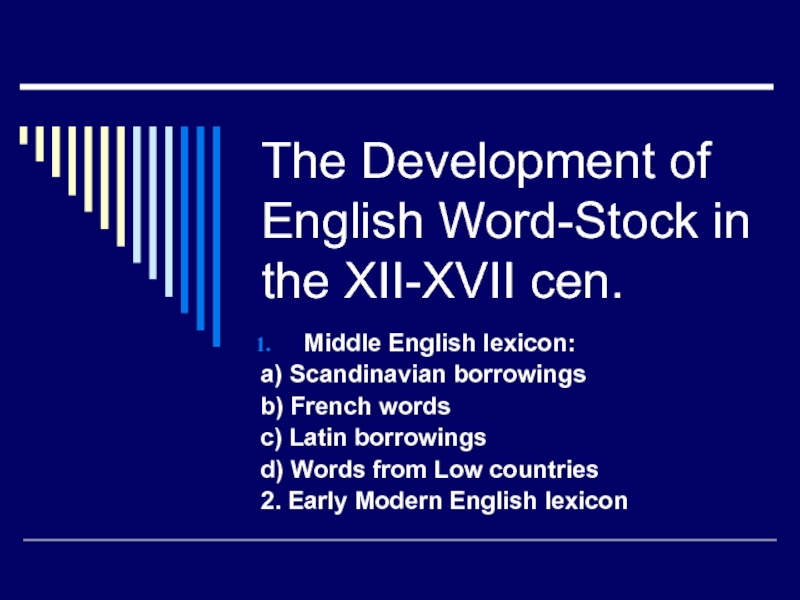
Слайд 2Scandinavian Influence
Sk: sky, skin, skill, skirt, (OE scyrte – shirt);
Retention
of the hard pronunciation of k and g: kid, dike
(gitch), get, give
Place names: (600 place): Derby, Rugby (districts occupied by Danes)
Nouns: root, trust, want, window
Verbs: get, give, die, crawl, raise
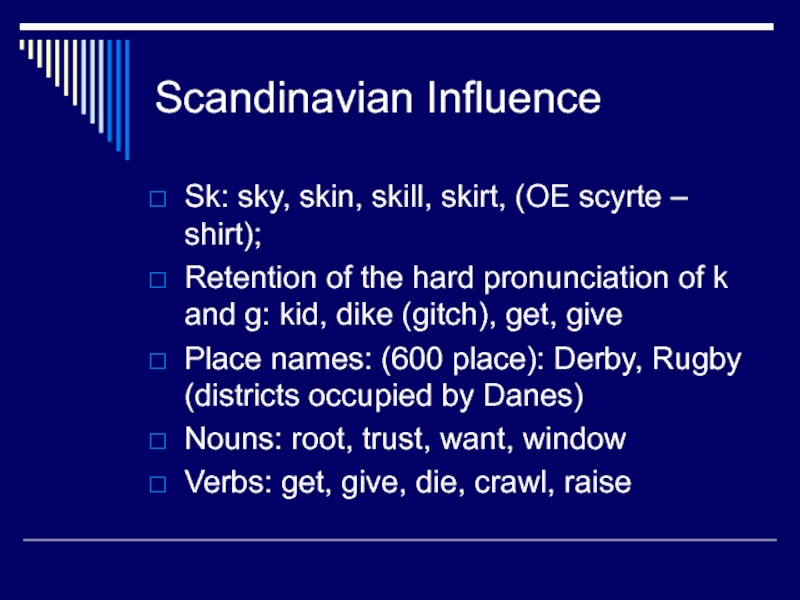
Слайд 4French borrowings (2 stages)
1066 – 1250 (900 in number)
1250 –
1500
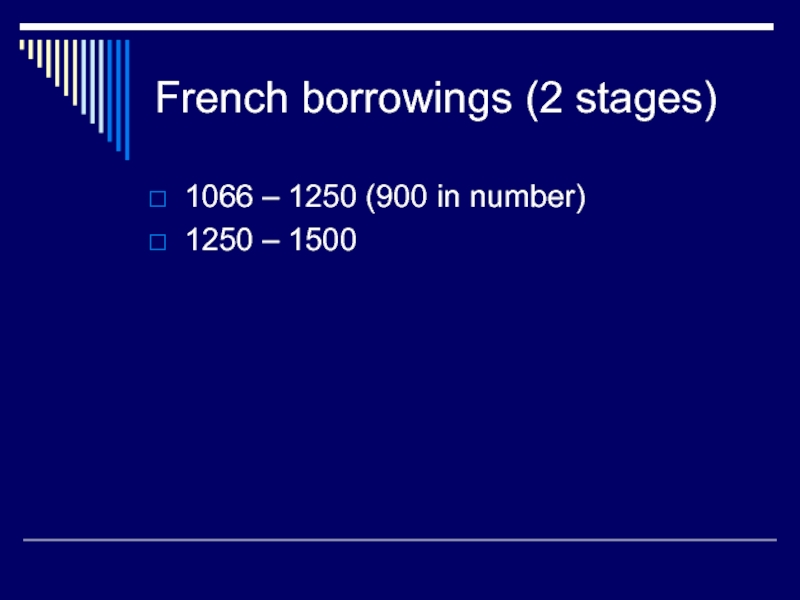
Слайд 51066-1250
a) French speaking nobility: noble, dame, servant
b) Literary channels (Charlemagne’s
romances): story, rime, lay
c) Church terms
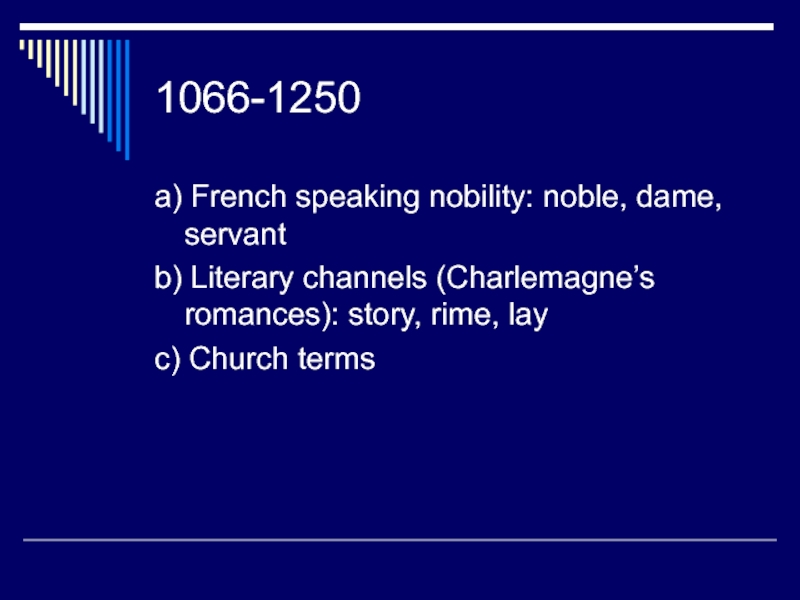
Слайд 61250-1500
Government and Administrative terms:
government, administer,
a) Fundamental terms:
crown, state, empire,
realm, reign, royal, tax, parliament, subsidy.
b) Titles of offices:
office, treasurer
c)
Economic organization of the society:
peasant, slave, servant
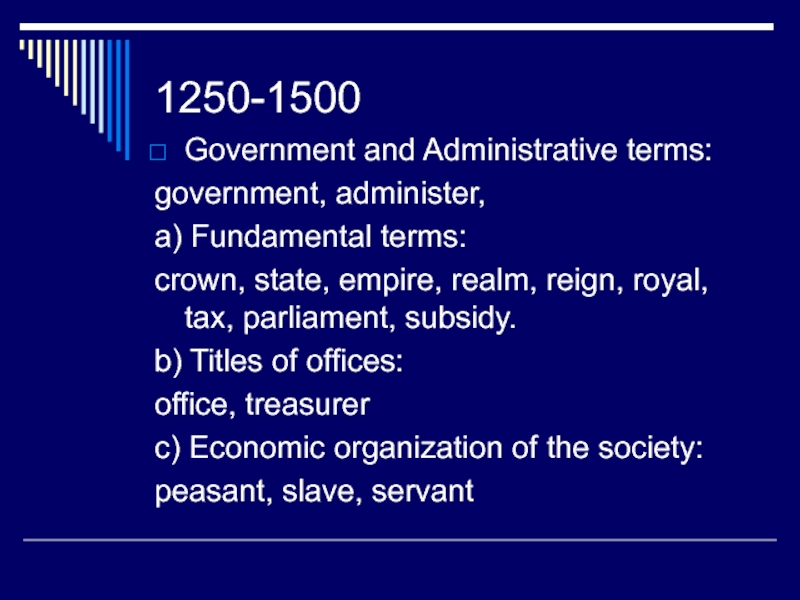
Слайд 12Ecclesiastical Words:
religion, theology, baptism, confession, prayer, lesson, passion.
Indications of rank
or class: clergy, clerk, dean, abbess
The names of objects associated
with religion: crucifix, image
Fundamental religious or theological concepts: salvation, virgin
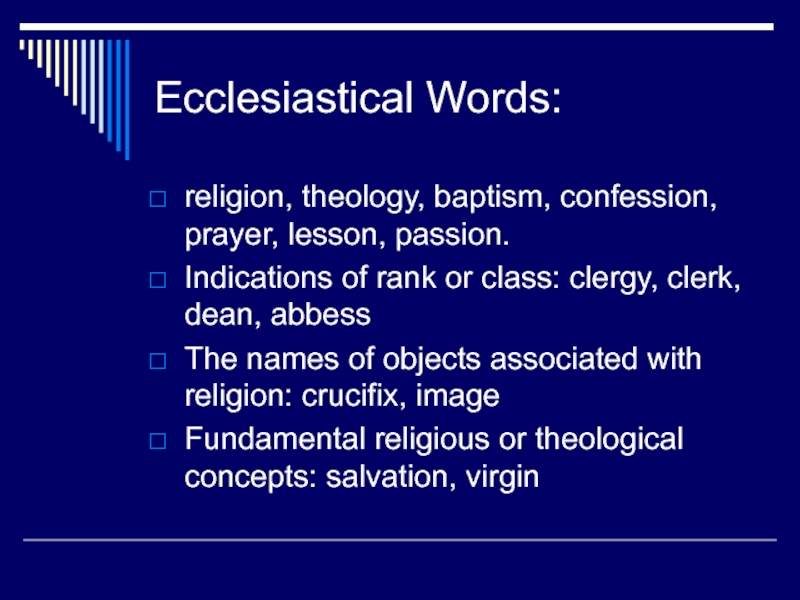
Слайд 13Law
Names of crimes and misdemeanors: felony, arson, larceny, fraud
Suits,
involving property: estate, bounds, property
Adjectives: just, innocent.
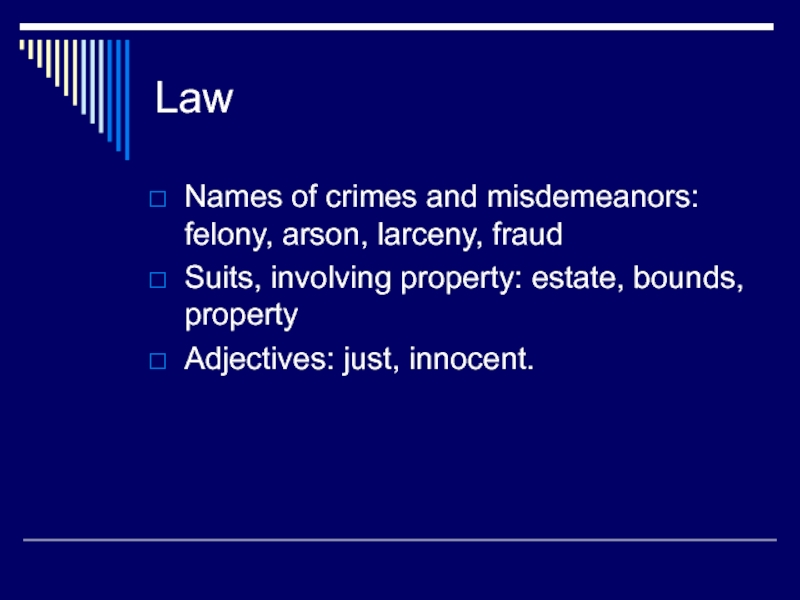
Слайд 14Army and Navy:
Navy, arms, battle, defense, soldier, spy, guard
Weapon: dart,
lance
Verbs: to arm, to array, to defend
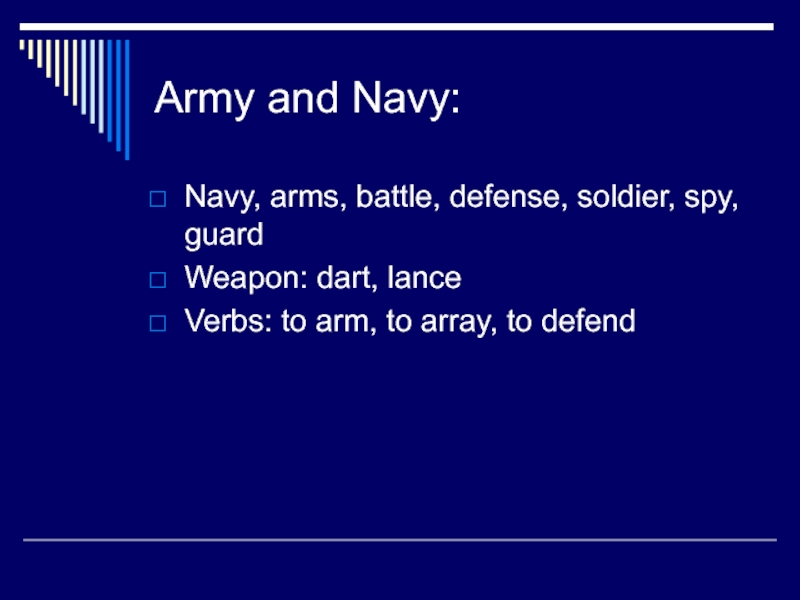
Слайд 15Fashion, Meals and Social Life
Gown, robe, frock, collar, embroidery
Verbs: adorn,
Collors:
blue, brown, scarlet;
Dinner, supper, feast.
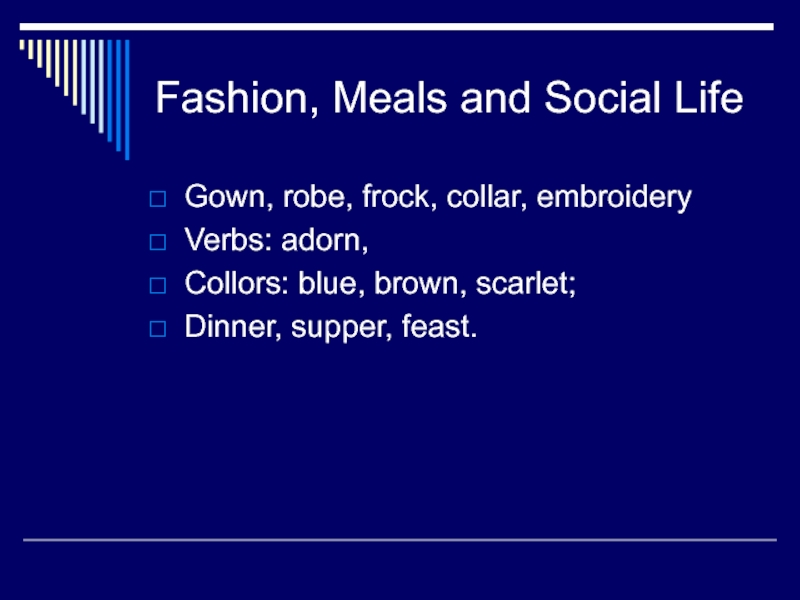
Слайд 16Art, learning, medicine
Art: art, painting, music, image, beauty
Literature: poet, romance,
chapter
Medicine: physician, surgeon, malady

Слайд 25Latin Borrowings (third period):
Intellect, legal, limbo, zenith
Terms relating to law,
medicine, theology, science, literature: -able, -ible, -ent, -al, -ous, -ive.
Aureate terms: unusual words: equipolent
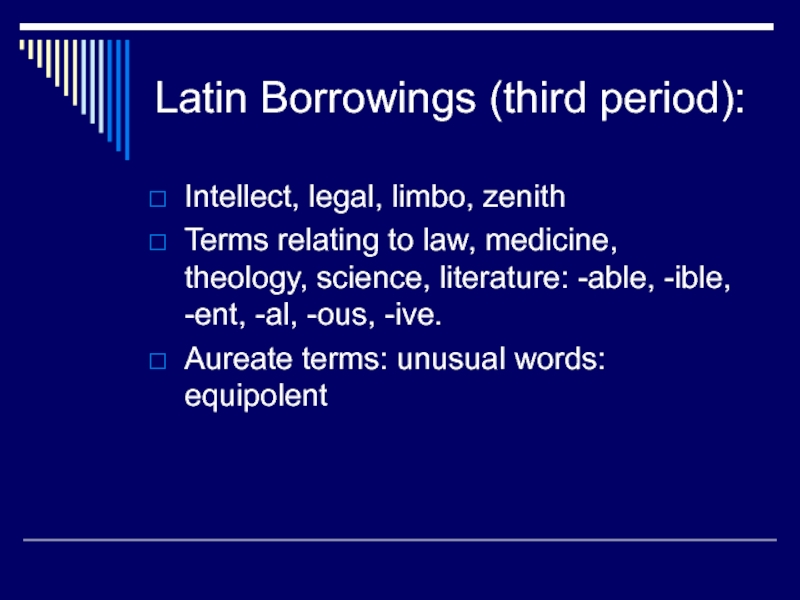
Слайд 29Synonyms of three levels:
Deed – exploit
Take – apprehend
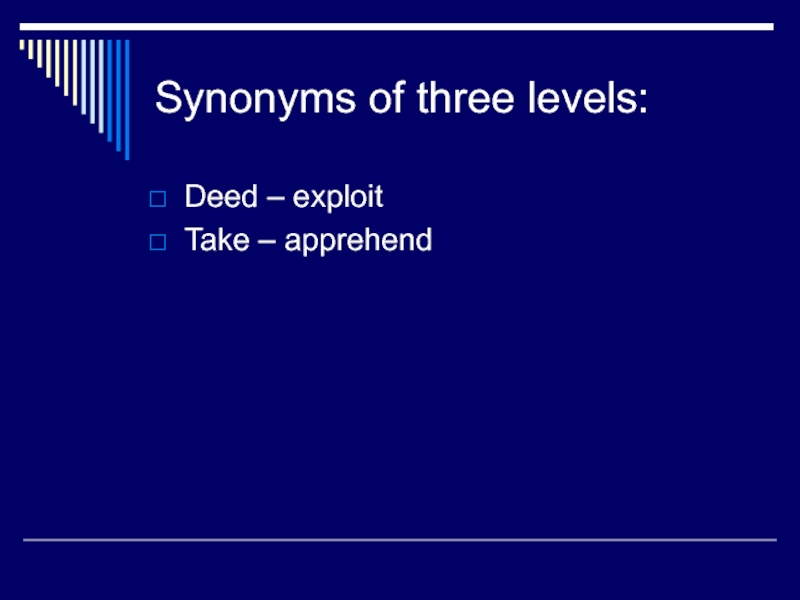
Слайд 30Towards the end of Middle English, a sudden and distinct
change in pronunciation (the Great Vowel Shift) started, with vowels
being pronounced shorter and shorter. From the 16th century the British had contact with many peoples from around the world.
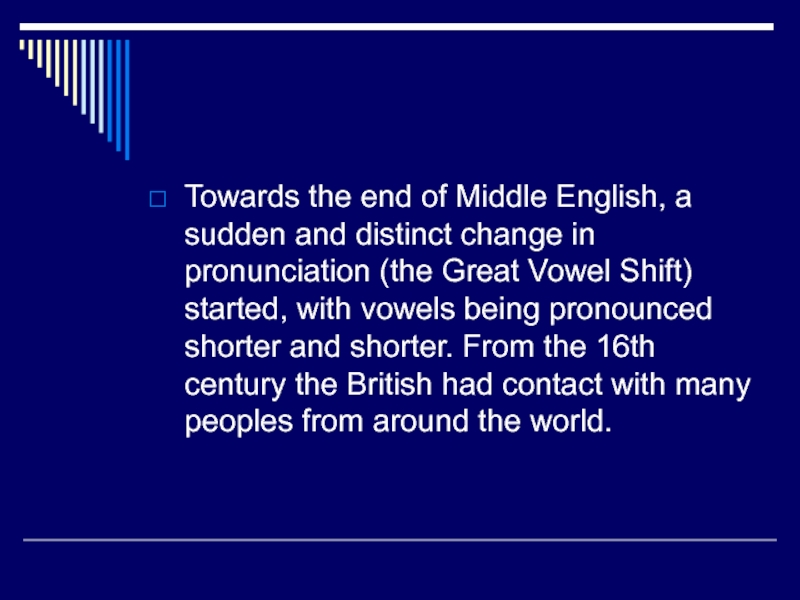
Слайд 31Words from Low Countries: Flemish, Dutch, Low German
trade: (Flemish)
navigation (Dutch
and Low German)
deck, freight, dollar
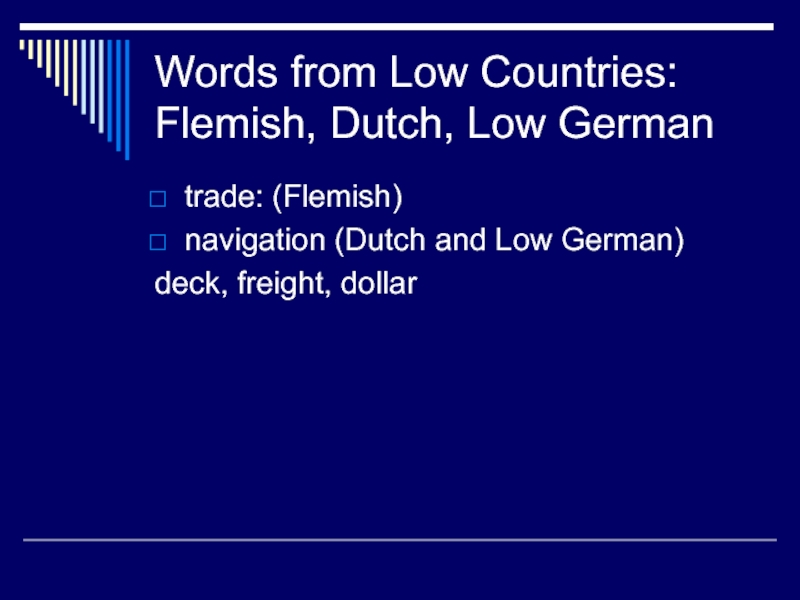
Слайд 32French:
Classical languages: free borrowing and reconstitution of roots and affixes
often in combination with native words and other loans; many
Latin borrowings were doublets of words previously borrowed from French or Latin (invidious/envious, camera/chamber, paralysis/palsy, fragile/frail); Greek loans were highly specialized, scholarly words (anarchy, aorist, aphrodisiac)

Слайд 33Lat: factum, French: fait, English: feat
Verbs (Lat. or French?) explore,
destroy.
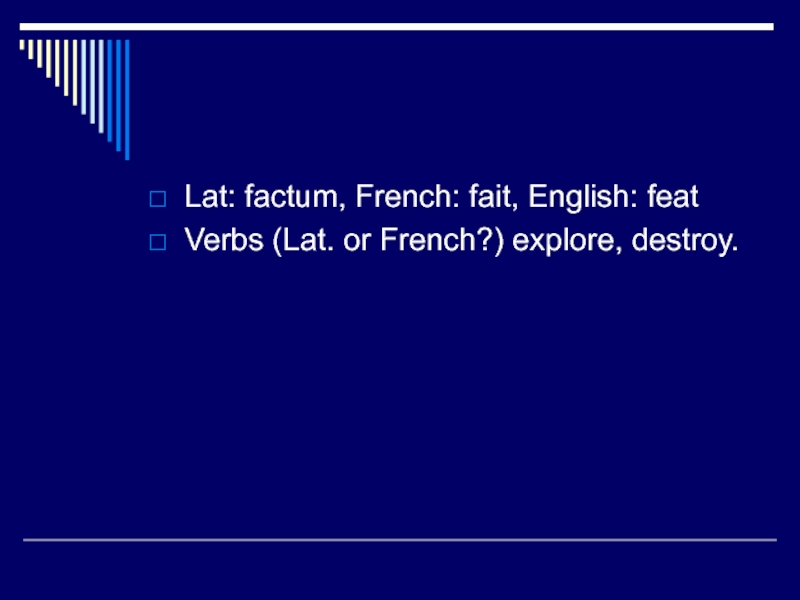
Слайд 34French, many borrowings in specialized words (hospitable, gratitude, sociable); Italian,
terms in trade, architecture, the arts (tariff, sonata, oratorio, balcony,
ghetto); Spanish and Portuguese, terms related to exploration, colonization, exotic products (Spanish: cigar, potato, tomato, hammock, breeze, cockroach; Portuguese: mango, tank, yam, molasses); Dutch, terms in trade, seafaring, painting (cruise, yacht, landscape, sketch, brandy, uproar); German, terms in geology, mining, etc. (quartz, zinc, noodle, plunder, waltz); Celtic (leprechaun, plaid, shamrock, trousers, whiskey).

Слайд 35Romance Languages
French (books): chocolate, detail, progress
Italian: balcony, algebra, design, violin,
volcano
Spanish and Portuguese: anchovy, armada, apricot, tobacco
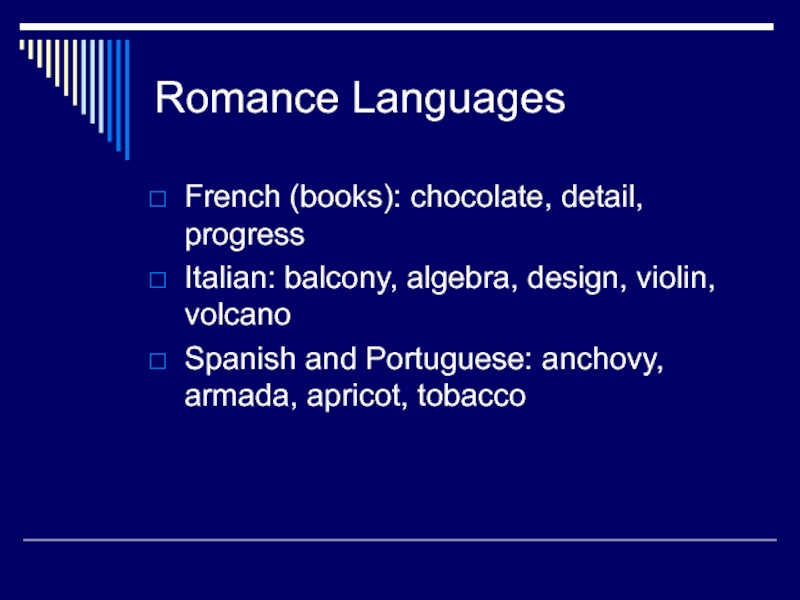
Слайд 36Non-Indo-European Languages
English settlements in North America, borrowings mostly from
from Algonquian languages, cultural terms, names of plants, animals, objects
(moose, raccoon, skunk, hominy, pecan, squash); Asian languages, Chinese (ketchup, tea, ginseng), Japanese (soy, sake), Hindi (jungle, shampoo, bandanna)
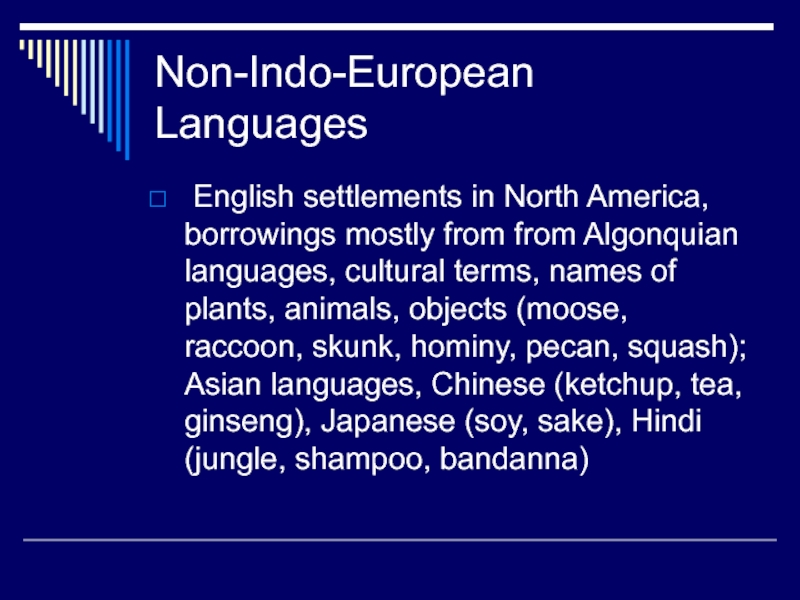
Слайд 37Word Formation
affixing was the largest source of new words in
English; new derivational affixes from Latin and Greek;
compounding (buttercup,
jellyfish, nutcracker, pickpocket, good-looking, old-fashioned);
functional shift or zero derivation (noun to verb: badger, capture, pioneer);
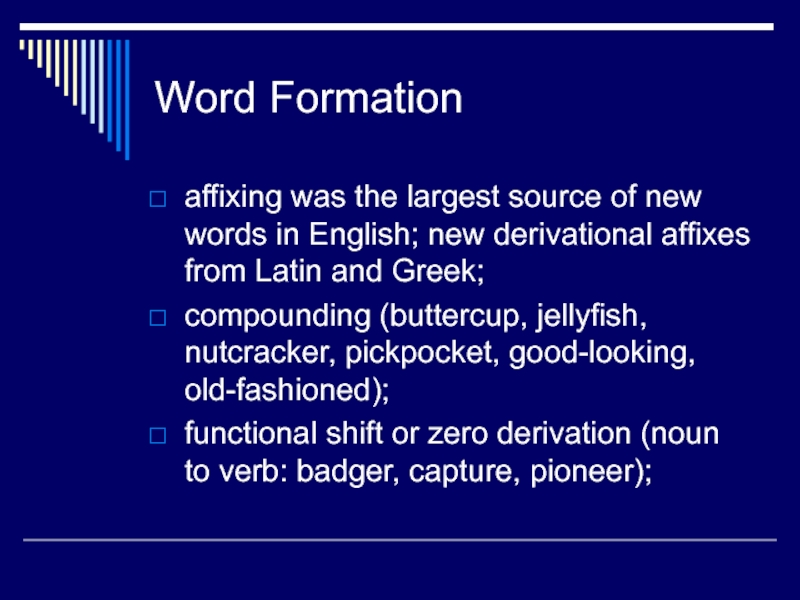
Слайд 38clipping (arrear > rear);
back-formation (greedy > greed, difficulty >
difficult, unity > unit);
blending (dumb + confound > dumfound);
proper
names>common nouns (Fauna > fauna);
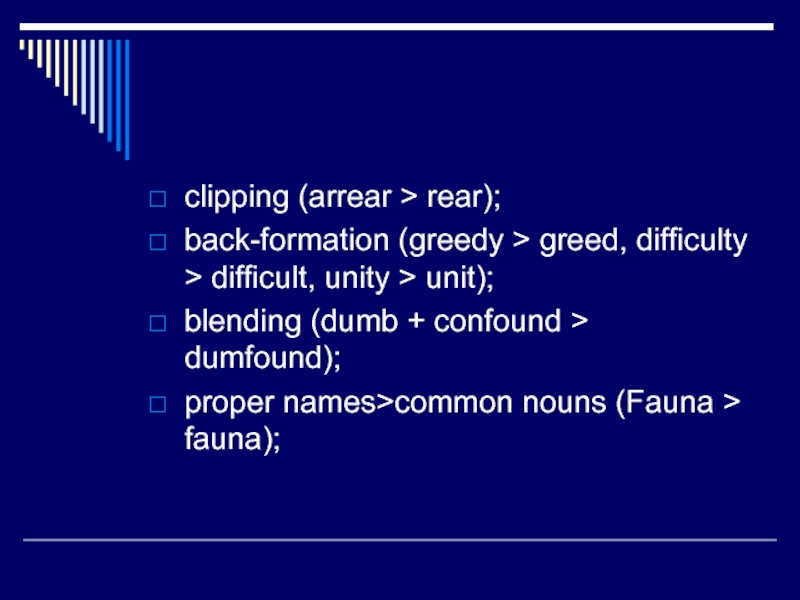
Слайд 39echoic words (boohoo, boom, bump, bah, blurt);
folk etymology (Dutch
oproer [up + motion] > uproar); verb + adverb (take-out
pick up);
reduplication (so-so, mama, papa);
words of unknown origin (baffle, chubby, lazy, pet, sleazy)
![The Development of English Word-Stock in the XII-XVII cen echoic words (boohoo, boom, bump, bah, blurt); folk etymology (Dutch oproer echoic words (boohoo, boom, bump, bah, blurt); folk etymology (Dutch oproer [up + motion] > uproar); verb](https://theslide.ru/img/thumbs/43e16ecb6ee0268d940356fa087b79be-800x.jpg)
Слайд 40Varieties of English
From around 1600, the English colonization of North
America resulted in the creation of a distinct American variety
of English.

Слайд 41In some ways, American English is more like the English
of Shakespeare than modern British English is. Some expressions that
the British call «Americanisms» are in fact original British expressions that were preserved in the colonies while lost for a time in Britain (for example trash for rubbish, loan as a verb instead of lend, and fall for autumn; another example, frame-up, was re-imported into Britain through Hollywood gangster movies).
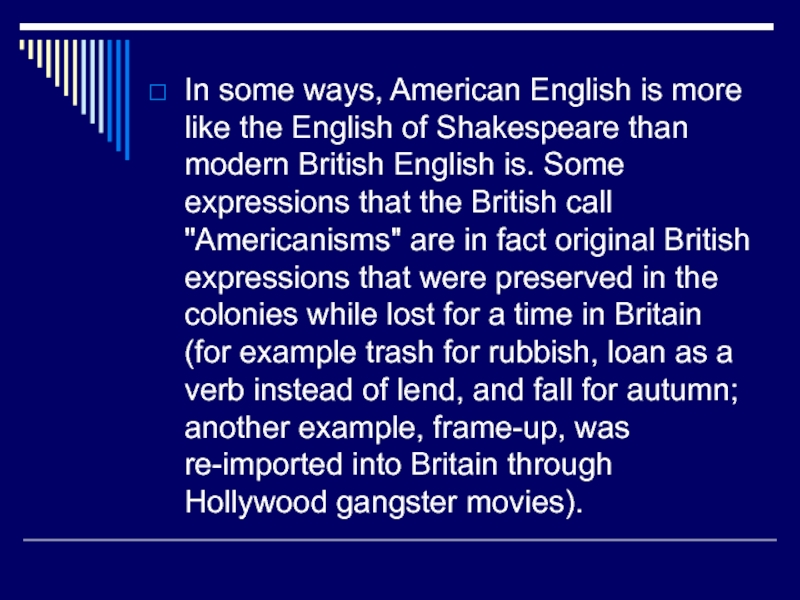
Слайд 42Spanish also had an influence on American English (and subsequently
British English), with words like canyon, ranch, stampede and vigilante
being examples of Spanish words that entered English through the settlement of the American West. French words (through Louisiana) and West African words (through the slave trade) also influenced American English (and so, to an extent, British English).
